
You’ve heard that dementia can affect elderly people as they age, but you may not know that dogs can get it, too. As with humans, the condition — which impairs memory, communication, focus, and more — develops in our canine companions as they get older.
The tricky thing is, the signs can be gradual and very subtle. With dogs, there’s the added challenge that they’re not able to tell us that something isn’t right.

The best thing for a pup parent to do, especially as their pooch enters their golden years, is to pay close attention. Never brush off a change in behavior, routine, physical appearance, or appetite, no matter how minor it seems.
A call to the vet regarding your dog’s health is never a bad idea; at best they’ll say there’s nothing to worry about, at worst, they’ll help you identify the problem and form a plan.
6 Subtle Signs of Doggy Dementia:
1. Disorientation
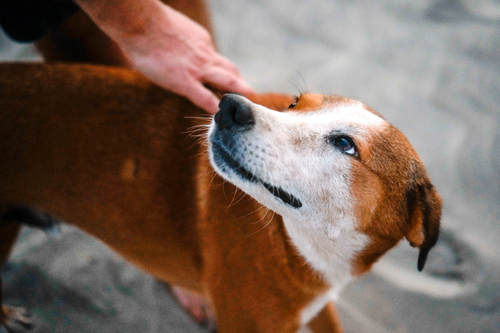
Disorientation is a common sign in human dementia patients, and PetMD explains that dogs experience this, too. If your pup can’t seem to “find” his way around the house or to the location of certain things — like his food bowls, which are always in the same spot — owners should definitely take notice. Dr. Bonnie Beaver, a board-certified veterinary behaviorist, explains:
“This often happens when the dog is out in the backyard and he goes to the wrong door or the wrong side of the door to get back in. The part of the brain that is involved with orientation has been affected.”
They may also start to lose their concept of spatial awareness, finding themselves “stuck” in a corner or behind a piece of furniture without knowing how to get back out. Sometimes, dogs with dementia will stare blankly at a wall or into thin air.
Pups can also get “disoriented” in their sense of time. PetMD uses the example of a dog no longer realizing that the darkened sky or your bedtime routine are cues that it’s time to sleep.
2. Changes in the Sleep-Wake Cycle
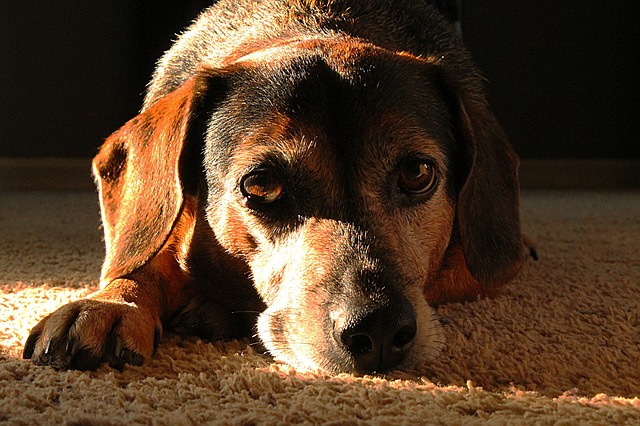
Adding to the example above, the brain of a dog with dementia may mix up her sleep-wake cycles. This means that a pup who used to sleep peacefully through the night is suddenly antsy, active, and unsettled.
“Many dogs reverse their normal schedules, so their daytime activities become their nighttime activities,” PetMD says.
Dr. Beaver suggests using a night light or white light to fabricate daylight, your dog’s new cue for sleeping, so pet parents can get some rest. Vet-prescribed medications can also help your pooch calm down in the evening.
3. Interactions With Humans, Other Dogs, Etc.
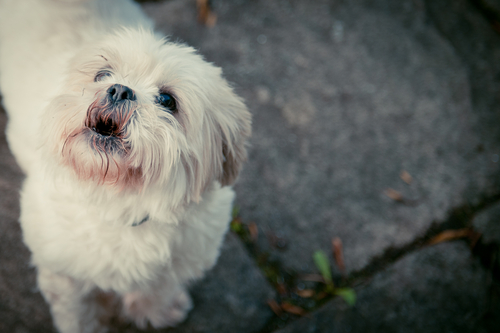
If your dog’s interactions with people or reactions to certain things drastically change, you should definitely take notice. Oftentimes, pups seem to “forget” the relationships they once had with their favorite people, and pooches who once loved children, other dogs, or mingling with strangers suddenly turn fearful, irritable, or even aggressive.
They also may become disinterested in certain things that used to excite them, like the promise of a walk, the doorbell ringing, or your entrance through the door.
Obviously, a sudden change in demeanor can be dangerous if the dog becomes unpredictable. It’s also important to note that these behaviors can be caused by many other conditions besides dementia. Your dog could feel sick or be in pain for another reason, so it’s imperative to consult with your vet to pinpoint the exact cause.
Dr. Denise Petryk, a former emergency room vet who now works with Trupanion pet insurance, uses this example:
“I’ve had patients whose dogs don’t recognize that their favorite cookies are treats for them. The owner’s first instinct is to buy other cookies. They don’t realize something else could be going on.”
4. Accidents in the House

This is another tricky symptom because it could be caused by a number of things, but when a house trained pet suddenly starts having accidents, it should always be checked out.
First off, never scold a trained pet who potties in the house, because there’s a good chance that something is wrong.
This could be a sign of dementia because pups whose cognition is affected may lose the ability to control their bodily functions. Or, they may no longer think to “tell” their humans when they need to “go.” Dr. Petryk says,
“After we run tests and rule out a bladder infection, kidney problems, or diabetes, then there’s usually been a cognitive change. If your dog is staring out at the sliding glass door and then poops in the house anyway and it’s not because of bowel trouble, then he’s lost the understanding that he should poop outside.”
5. Lower Energy
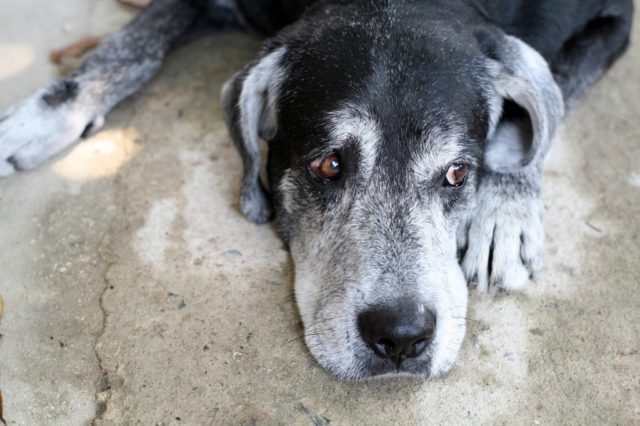
This is yet another sign that can have multiple causes. It’s normal for a dog’s activity levels to decrease with age, but a lack of energy, especially accompanied by a lack of interest, could indicate cognitive issues.
Once-curious dogs may no longer care to sniff the grass outside, and they may prefer a nap over the play sessions that used to make their tails wag. Or, maybe they seem to completely lose focus or get disoriented, say, in the middle of a game of fetch.
“They may drop something when they’re eating and they can’t find it,” says Dr. Petryk. “If they don’t have sight or hearing issues, this can be a true indication that they are experiencing cognitive dysfunction.”
Again, some of these could be signs of arthritis, pain, or a number of other conditions, but no matter the cause, they should be evaluated by a vet.
6. Repetitive or Obsessive Behaviors
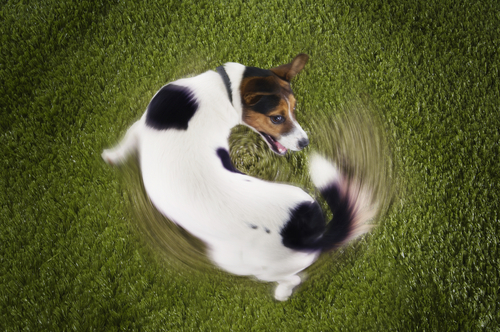
In addition to a change in normal activity, a dog with dementia may engage in repetitive activities. Dr. Petryk explains:
“They may exhibit repetitive motion; things like head bobbing, leg shaking, or pacing in circles. This kind of action is more related to cognitive dysfunction or a degeneration of the brain. It’s less likely to be mistaken for anything else.”
Even repetitive barking, for seemingly no reason, could indicate cognitive dysfunction.
How Can You Help a Dog with Dementia?
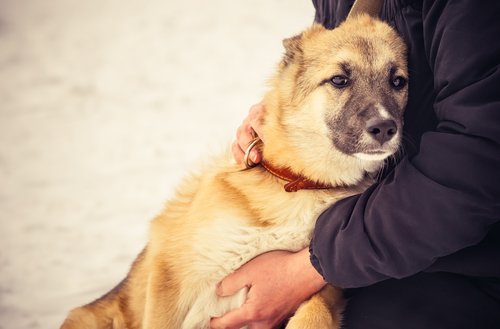
Unfortunately, dementia can’t be “cured,” but its effects can be slowed and its symptoms managed.
“You can’t stop the process but it’s possible to slow it down so they don’t go from one problem to three problems,” Dr. Beaver told PetMD.
Diet Changes
Believe it or not, changes in diet can help support your dog’s cognitive function. Of course, dietary changes should be approved by your vet, but foods and supplements with omega-3 fatty acids and antioxidants can help keep cells healthy, according to PetMD.
Brain Games
Another thing that pet parents can do is introduce “brain games” for mental stimulation. Puzzle toys like the BrainBall are a great way to keep your dog’s mind active while rewarding him with treats. In fact, if he’s up any kind of activity, take some time to engage with him.
If your pup is still interested in playing with friends, keep socializing him around friendly people and his canine buddies. Dr. Petryk suggests:
“If your dog doesn’t have physical restrictions, grab his leash and take him to the dog park where he can socialize with other dogs. It’s possible to slow deterioration by keeping him physically and mentally active, just like it is for us.”
Medications & Supplements
If your dog is diagnosed with dementia, there are certain medications and supplements your vet can prescribe. Of course, regular check-ups are imperative in keeping track of the progress of the condition. The more you know, the better you can help your pup.
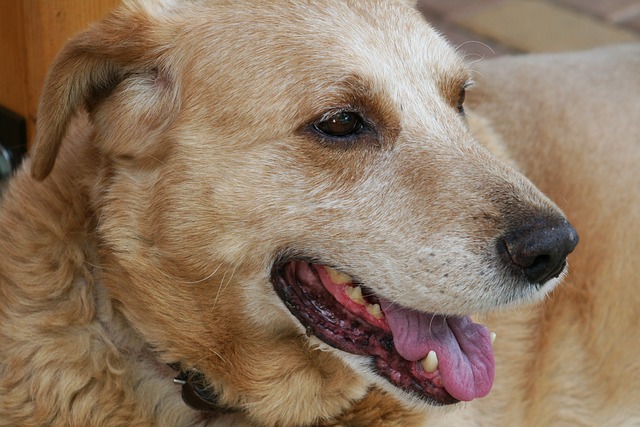
When we bring a dog home, it’s a commitment for life. While it can be hard to watch our furry family members age and their health decline, loving pet parents will do anything to give them the best life possible, for as long as possible. After all, it’s the least we can do after all they’ve done for us! With a little symptom management and a lot of love, you can help a dog with dementia feel comfortable and happy.
(h/t: PetMD)
These statements have not been evaluated by the Food and Drug Administration. This product is not intended to diagnose, treat, cure, or prevent any disease. The information on this website is not intended to replace a one-on-one relationship with a qualified healthcare professional.
The post 6 Signs Of Dementia In Dogs & How You Can Help appeared first on iHeartDogs.com.
from iHeartDogs.com https://ift.tt/2DpwLAV https://ift.tt/2R3OpSy

No comments:
Post a Comment